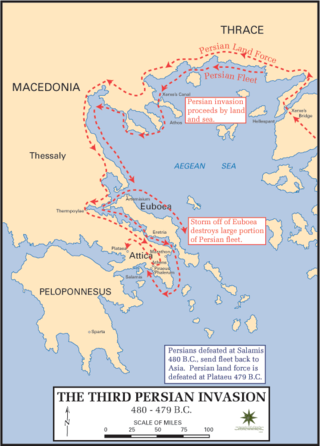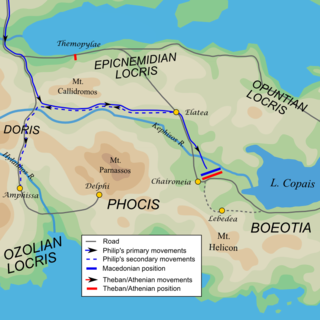Related Research Articles

The Peloponnesian War was an ancient Greek war fought between Athens and Sparta and their respective allies for the hegemony of the Greek world. The war remained undecided for a long time, until the decisive intervention of the Persian Empire in support of Sparta. Led by Lysander, the Spartan fleet, built with Persian subsidies, finally defeated Athens and started a period of Spartan hegemony over Greece.

The 5th century BC started the first day of 500 BC and ended the last day of 401 BC.
Year 481 BC was a year of the pre-Julian Roman calendar. At the time, it was known as the Year of the Consulship of Vibulanus and Fusus. The denomination 481 BC for this year has been used since the early medieval period, when the Anno Domini calendar era became the prevalent method in Europe for naming years.
Year 431 BC was a year of the pre-Julian Roman calendar. At the time, to Romans it was known as the Year of the Consulship of Cincinnatus and Mento. The denomination 431 BC for this year has been used since the early medieval period, when the Anno Domini calendar era became the prevalent method in Europe for naming years.
Year 491 BC was a year of the pre-Julian Roman calendar. At the time, it was known as the Year of the Consulship of Augurinus and Atratinus. The denomination 491 BC for this year has been used since the early medieval period, when the Anno Domini calendar era became the prevalent method in Europe for naming years.
This article concerns the period 499 BC – 490 BC.
This article concerns the period 489 BC – 480 BC.
This article concerns the period 459 BC – 450 BC.
This article concerns the period 449 BC – 440 BC.

Year 480 BC was a year of the pre-Julian Roman calendar. At the time, it was known as the Year of the Consulship of Vibulanus and Cincinnatus. The denomination 480 BC for this year has been used since the early medieval period, when the Anno Domini calendar era became the prevalent method in Europe for naming years.
This article concerns the period 439 BC – 430 BC.

Lysander was a Spartan military and political leader. He destroyed the Athenian fleet at the Battle of Aegospotami in 405 BC, forcing Athens to capitulate and bringing the Peloponnesian War to an end. He then played a key role in Sparta's domination of Greece for the next decade until his death at the Battle of Haliartus.

Year 338 BC was a year of the pre-Julian Roman calendar. At the time it was known as the Year of the Consulship of Camillus and Maenius. The denomination 338 BC for this year has been used since the early medieval period, when the Anno Domini calendar era became the prevalent method in Europe for naming years.
Year 409 BC was a year of the pre-Julian Roman calendar. At the time, it was known as the Year of the Consulship of Cossus and Medullinus. The denomination 409 BC for this year has been used since the early medieval period, when the Anno Domini calendar era became the prevalent method in Europe for naming years.
Year 457 BC was a year of the pre-Julian Roman calendar. At the time, it was known as the Year of the Consulship of Pulvillus and Augurinus or Cincinnatus and Vibulanus. The denomination 457 BC for this year has been used since the early medieval period, when the Anno Domini calendar era became the prevalent method in Europe for naming years.
Pleistoanax, also spelled Plistoanax, was Agiad king of Sparta from 458 to 409 BC. He was the leader of the peace party in Sparta at a time of violent confrontations against Athens for the hegemony over Greece.
Leotychidas II was king of Sparta between 491–476 BC, alongside Cleomenes I and later Leonidas I and Pleistarchus. He led Spartan forces during the Persian Wars from 490 BC to 478 BC.
Pleistarchus was the Agiad King of Sparta from 480 to 458 BC.
The First Peloponnesian War was fought between Sparta as the leaders of the Peloponnesian League and Sparta's other allies, most notably Thebes, and the Delian League led by Athens with support from Argos. This war consisted of a series of conflicts and minor wars, such as the Second Sacred War. There were several causes for the war including the building of the Athenian long walls, Megara's defection and the envy and concern felt by Sparta at the growth of the Athenian Empire.
Nicomedes was a Spartan military commander and a scion of the royal Agiad dynasty. He was a regent of Sparta during the minority of Pleistoanax, the son of his brother Pausanias.
References
- ↑ Livy. From the Founding of the City.
- ↑ Hall, Edith; Macintosh, Fiona; Wrigley, Amanda (January 8, 2004). Dionysus Since 69: Greek Tragedy at the Dawn of the Third Millennium. OUP Oxford. p. 344. ISBN 978-0-19-155541-1.